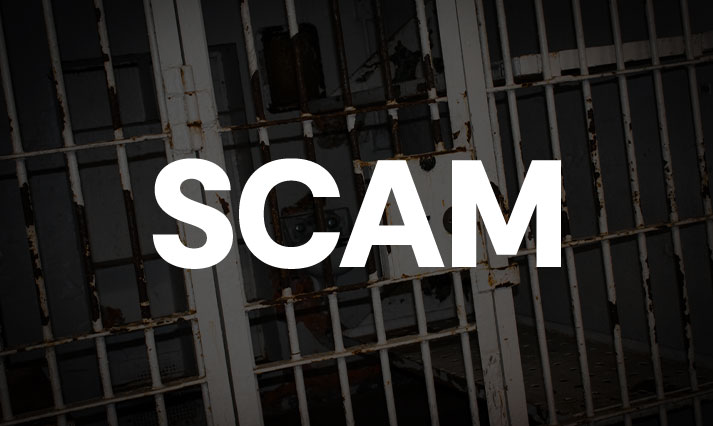In this Scam Series we’ve covered jury duty scams, relationship scams, bank and crypto ATM scams, scams involving internet fraud and gift cards, and a scam where our heroine was able to get her scammed mom’s money back. But where do scammers come from? Sometimes they scam based on what they know? What do we mean? Follow along here.
Det. Michelle Taylor of the Peachtree City Police Department wanted the public to know that there are many scams out there that ask people to pay to get out of failure to appear warrants for court dates people supposedly had.
Captain Brian Lee at the Fayette County Sheriff’s Department also sees bonding scams, in some cases after people have actually been arrested. “These are the people that have been booked in booking photos. They’ll look folks up, do a little Google search, and then call that person’s family and say, ‘Hey, this is ABC Bonding and we’re trying to get your boy Billy out of jail, but we are going to need $200.’”
Capt. Lee says this can look similar to the jury scam we covered in last week’s Scam Series article. They’ll say, “go buy some gift cards, Venmo me or CashApp me.”
Additionally, a third scam involves parole. They’ll say, “ Hey, Billy didn’t pay his parole this month. If you don’t get him caught up, we’re going to have to put him back in prison. So they’re all kind of spin offs of one another. We had several victims here in Fayette, and our investigators were able to trace a lot of the perpetrators involved. Sometimes money is pulled back, sometimes it’s already spent,” said Capt. Lee.
Who knows best about failure to appear, warrants, arrests and parole? Criminals. In one case Capt. Lee tracked, the scammer “was an inmate in an Alabama prison who was serving a life sentence for murder.”
In another case, “The second inmate they were able to identify was a Georgia inmate. Understand the guys in prison have nothing more to do, but to discuss methods and techniques of frauds. They’ve worked in the past that work, they have nothing but time on their hands. And because the FCC won’t allow cell phone signals to be jammed, they have cell phones and can sit in the comfort of their own cell and commit fraud all day every day. And that’s the most frustrating thing.”
Often, fraud comes from countries like Nigeria, where Det. Taylor says the scams may support whole villages, and they are in no hurry to crack down on it. But fraud happening on US soil is often perpetrated by criminals already doing time in prison or by other kinds of criminals.
Det. Taylor says that gangs now consider fraud to be their new money maker. “Think of how safe it is for a gang member instead of robbing places or stealing from stores or burglarizing how much they can make by with all the data breaches that have happened over the past decade.”
Every time you hear that a company has had a data breach—this is the possibility that your information could be sold over the dark web to possible scammers. So anyone could be vulnerable to a scam attack that would seem legit, because they know things about you, your accounts, your banking.
It can equal big money. Detective Taylor referenced one case that the Peachtree City Police worked on in 2023 that had a man scammed into buying gold bars, shipping them to his home and having a courier pick them up. That scam victim “was out to the tune of over $3 million.”
“Some of it he did over crypto, and we were actually able to find the wallet that the crypto had gone through, and we were actually successful in freezing some of that money,” said Det. Taylor. “But I think it was to the tune of like $20,000 or $40,000 back in crypto out of the $700,000 he sent. Because it it went overseas. We traced this scammed through, I think it was India, via England, via Canada. I wasn’t the investigating detective on that, but the one who was, they had suspects. They were the Money Mules, basically they’re the couriers. They’re the smaller cog in the wheel for the bigger people to go pick up the money. So there were arrests made.”
Det. Taylor was the lead investigator on another scam. “I had a scam with the whole account takeover where we were able to trace it to a violent gang member in Chattanooga, Tennessee and an arrest was made with that one as well as tying him to other cases in other parts of the country.”
From previous articles we know that scammers can be sophisticated with their technical prowess. They can be convincing with their stories. They can seem to cure loneliness for our most vulnerable people. And now we know that they can be from violent gangs or even calling straight out of a prison or jail.
What can be done about that? The Federal Communications Commission (FCC) has a law against cell phone jammers. Capt. Brian Lee thinks passing some commonsense legislation around that would keep criminals from running enterprises, including drug running and scams while in prison. Capt. Lee says that prison guards aren’t even allowed to use cell phones while working, so this wouldn’t hurt them.
Capt. Lee says the fact that nothing has been done to remedy this situation is “bonkers.”
“If victims knew or if you had a loved one that was victimized, let alone murdered, and you found out that the person that did it has been financially benefiting from sitting in a prison, I would think you would lose your ever-loving mind,” said Captain Lee.
He said, “It is common sense. It doesn’t make sense to allow prisoners to perpetuate criminality.
“It’s been going on for years. And we know it because this is nothing new. I know firsthand of a Secret Service agent who had cell phone tracking capabilities. They had real expensive equipment that could pinpoint the exact location of cell phones, and oftentimes that equipment would lead them to the perimeter fence of a Georgia prison, and that’s where their authority ended. They couldn’t enter the prison.”
Prison serves to protect criminals from getting caught in their cell phone scams.
What’s more, if they are caught, it will come to a major cost for Fayette County taxpayers. Capt. Lee explains, “If you do stop them and we charge those people in prison, Fayette County taxpayers are now going to have to fund the transport of that prisoner back to a Fayette County Jail. They’re going to have to fund them to be an inmate in the Fayette County Jail while they await all their different court proceedings. And then they will have to fund him being transported back to the prison where he was at when he committed the crime in the first place.”
Capt. Lee thinks it’s better to stop the calls at the source with cell phone jammers.
The Citizen contacted Congressman Brian Jack about this question. He got back to us with some research, including a white paper from the FCC and an article from Georgia’s Attorney General. The FCC white paper is about Inmate Call Capture technology, suggesting it would be possible to put this in place, where only 911 calls and those from approved cell phones could get through—so that visitors to prison or first responders could use their phones, but inmates could not. The white paper from the FCC says that Inmate Call Capture has been used successfully in Mississippi.
Georgia’s Attorney General Chris Carr last year urged the FCC to allow cell phone to allow the use of cell phone jamming devices within state prisons and local jails. He said, “The easiest way to protect the public from the harms caused by contraband cell phones is to allow for the use of cell phone jamming technology in prisons and jails, but the FCC continues to block our efforts. This outdated guidance limits legitimate law enforcement tools , presents dangerous conditions for correctional officers, and allows for the escalation of criminal networks both inside and outside prison walls.”
If you want to follow our local Fayette County Sheriff’s Department Captain Brian Lee and Attorney General Chris Carr’s advice to allow and fund some kind of cell jamming available in our prisons, contact Congressman Brian Jack, Senator Raphael Warnock and Senator Jon Ossoff. This legislation would take an act of Congress.













Leave a Comment
You must be logged in to post a comment.